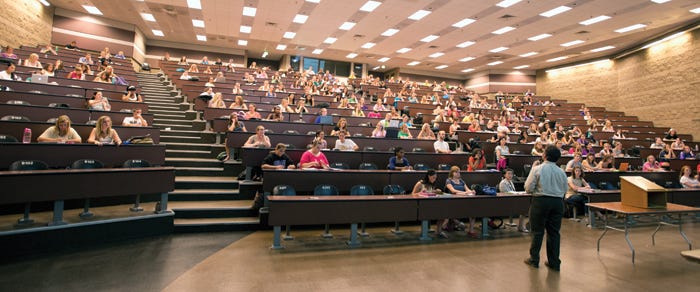A (one-page) Christian humanist vision for faithful academic work in the modern pluralistic, professionalizing university
What would a Christian humanist vision for the work of discovering and teaching knowledge and forming students in the modern pluralistic, professionalizing university look like? And how can such a vision be framed for Christian faculty teaching in a multitude of (often technical) disciplines, who are non-specialists in Bible, theology, Christian history (etc.)? The following is an attempt to make this case in one page. It is a draft that will no doubt be modified before it is implemented.
Our educational vocation: The educational task of Christians in the modern university is to broaden and anchor the pursuit of knowledge and personal formation within a hyper-specialized and professionalized setting of learning and teaching. We must broaden our work by recovering trust in the unity and reliability of our knowledge of the whole world, ourselves, and God (the “liberal arts”); and anchor our teaching and mentoring of students in a commitment to preparing them for characterful vocation. In the long Christian humanist tradition (CH), this pursuit of unified knowledge and character formation has been underwritten by belief in the high worth, dignity, and vocation of humanity, imaged fully and perfectly in Christ, into whose likeness we are being remade. Needing now to heal four alienations of modernity, we turn to CH to resource this educational vocation (e.g. Newman, Schwehn, Naughton).
Epistemology: Healing the alienation of mind from world. CH has believed in the competence of human reason to pursue truth; that is, reliable and unified knowledge of the Real, rather than a subjective mishmash of unreliable, disjointed knowledge. We believe that our knowledge of the Real (cosmos, humanity, and God) is reliable and unified because the God of Christian Scripture who has created us in his (rational) image and entered his own creation as a rational human person is reflected in all he has created. We can trust our minds to give us access to knowledge of the Real because God gave us reason to understand and navigate the world for our flourishing (e.g. Lewis, Wolterstorff, Harrison).
Ontology and Cosmology: Healing the alienation of world from God. CH has believed the world is rational, orderly, and stable, reflecting the rational and constant nature of God who made it (e.g. Finlay, Harrison). CH has believed the world, including humanity, participates in the glory of God (participatory ontology); it is thus appropriate to approach the world in awe and wonder of its beauty – which communicates also its goodness and truth (e.g. Davison, Boersma).
Anthropology: Healing the alienation of humanity from purpose (our telos and story). CH has believed in the high destiny and fundamental dignity and equality of all humans. We share a high purpose and vocation, since God has created us in his image to enjoy communion with him in eternity and to represent him on earth by cultivating and having dominion over it. (e.g. Lewis, Zimmermann, Cortez/Barczi). CH has believed that each of us has been alienated from that purpose through sin and can now be restored to it by being remade in his image–that is, the image of full, perfect humanity as revealed in Christ (e.g. the Orthodox tradition, Lewis, Zimmermann, Copan et al.).
Ethics: Healing the alienation of vocation from character. CH has believed that to fulfil our purpose and vocation(s) requires character formation; we must not just master practical skills or obey ethical laws but also engage in disciplined, graced formation of habits (settled dispositions, known in CH as “virtues”). The long CH educational tradition (paideia) has worked out the nature and dynamics of particular virtues, such that formation in them (and against their opposite vices) prepares us for good action in our multiple, simultaneous vocations (e.g. Anscombe, MacIntyre, Pinckaers).



